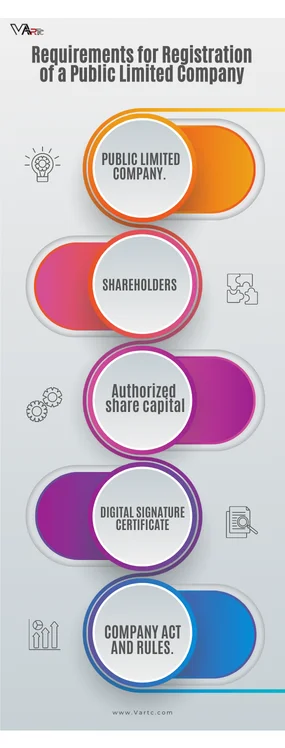Public Limited Company Registration
Online Public Limited Company Registration in India - An Overview
In India ,one of the most Highly recommended Approaches for Commencing a Business is by setting up a private limited Company. This type of company offers limited liability to its shareholders while also imposing specific Ownership restrictions. In the case of a Limited Liability Partnership (LLP) ,the business is managed by its Partners. In Contrast ,with a private limited company registration ,a clear distinction exists between directors and shareholders ,as they are separate entities.
As your reliable legal advisor VARTC offers an affordable service to help you register your company in India. We take care of all the necessary legal Procedures and ensure strict compliance with the regulations set by the Ministry of Corporate Affairs (MCA). Once the Pvt Ltd company registration process is successfully completed ,we provide you with the essential documents ,including the Incorporation Certificate (CoI) ,PAN ,and TAN. Armed with these documents, you can easily open a bank account and kickstart your Business Operations with Confidence.
Requirements for Registration of a Public Limited Company
When Registering a Public limited company ,it is essential to Adhere to the rules and regulations Specified under the Companies Act ,2013. Here are Some key points to consider:
- Minimum 7 shareholders are required to form a public limited company.
- Minimum of 3 directors is required to form a public limited company.
- A minimum authorized share capital of Rs. 1 lakh is required.
- Digital signature certificate (DSC) of one of the directors is needed while submitting self-attested copies of identity and address proof.
- Directors of the proposed company will need a DIN.
- The Name of the company must be as per the Provision of the Company Act and Rules.
- Documents like the Memorandum of Association (MOA) ,Articles of Association (AOA) and duly filled Form DIR – 12 are needed.
- Payment of the prescribed registration fees to the ROC is required.


Characteristics of a Public Limited Company
Directors
Under the provisions of the Companies Act ,2013 ,the formation of a public limited Company necessitates a minimum of three directors. However ,there is no limitation imposed on the Maximum number of directors that can be appointed. This Flexibility allows for the inclusion of Additional directors as required ,enabling effective governance and Management of the Company.
Limited Liability
In a Public limited Company ,each Shareholder’s liability is limited, meaning they are not personally responsible for any losses or debts of the company beyond the amount they have invested. This is in contrast to partnerships and Sole proprietorships ,where the partners and business Owners can be jointly and severally liable for the Business’s debts.
However ,it is Important to note that this limited liability protection does not grant Shareholders immunity from their own illegal actions. If a shareholder engages in unlawful activities ,they will be held Accountable for their actions and may face legal consequences accordingly. This safeguard ensures that while Shareholders are Protected from the Company’s liabilities ,they are still bound by legal and ethical Responsibilities.
Paid-up Capital
According to the law ,a public limited Company must have a minimum Paid-up capital of Rs 5 lakh or a higher amount as specified in the applicable regulations.
Prospectus
A prospectus is a detailed document that provides comprehensive information about a public limited company’s affairs and is issued to the public. Public limited companies are required to issue a prospectus as per the legal provisions. However ,this requirement does not apply to Private Limited Companies. The reason behind this is that private limited companies are not allowed to invite the public to subscribe to their shares. Hence, they do not need to issue a prospectus as they operate with a limited number of shareholders and do not engage in public fundraising activities.
Name
According to the Companies Act ,2013 ,it is mandatory for all public companies to include the word ‘Limited’ after their Name.

Advantages of Public Limited Companies
More capital
Shares in a Public limited Company are available for purchase by the general public ,allowing anyone to invest in the company. This open offering of shares helps in improving the company’s capital as it can attract a large number of investors from various backgrounds and financial capacities.
More attention
When a Public Limited Company gets listed on a stock market, it gains visibility and attention from mutual funds ,hedge funds ,and other traders. This increased exposure can lead to better business opportunities for the company.
Spreading risk
By selling shares to the general public, a Public Limited Company effectively spreads out the unsystematic risk of the market.
Growth and expansion opportunities
With limited liability and reduced risk for shareholders ,a Public Limited Company has an ideal opportunity to grow and expand its business. By raising funds through the issuance of shares ,the company can invest in new projects and ventures.
Procedure for Registration of a Public Limited Company
Step 1:
Digital Signature Certificate (DSC)
The registration procedure for a company is now fully conducted online, making a digital signature mandatory for filing forms on the MCA (Ministry of Corporate Affairs) portal. Every proposed director and subscriber of the memorandum and articles of association must possess a Digital Signature Certificate (DSC).
Step 2:
Director Identification Number (DIN)
A Director Identification Number (DIN) is a Unique identification number that every individual intending to become a director in a company must obtain. Along with name and address proof ,the DIN of a proposed director must be mentioned in the company registration form.
Step 3:
Registration on the MCA Portal
To apply for company registration, the Director must submit a completed SPICe+ form on the MCA (Ministry of Corporate Affairs) portal. Before filling the SPICe+ form and submitting the necessary documents, the Director needs to register on the MCA portal. Once the registration process is done, the Director will gain access to various MCA portal services, which include filing e-forms and viewing public documents
Step 4:
Certificate of Incorporation
Once the registration application ,along with the required documents ,is submitted ,it undergoes inspection by the Registrar of Companies (ROC). After verifying the application ,the ROC issues the Certificate of Incorporation for the Public Company. After obtaining the Certificate of Incorporation from the ROC ,the company must apply for the 'Certificate of Business Commencement' as well
Documents Required for Incorporating a Public Limited Company
- Proof of identity of all the Shareholders and directors.
- Proof of address of all the directors and the shareholders.
- PAN number of all the shareholders and directors.
- Utility bill of the proposed office i.e. proposed registered office for the company.
- A NOC (No Objection Certificate) from the landlord where the office of the company will be situated.
- Director Identification Number (DIN) of all the directors.
- Digital Signature Certificate (DSC) of the directors.
- Memorandum of Association (MOA).
- Articles of association (AOA).
Annual Compliances for a Public Limited Company
Unlisted Company
- Board Meetings: Under the Companies Act ,2013 ,an unlisted Public Limited Company is mandated to conduct a minimum of four board meetings during a financial year.
- Appointment of a Cost Auditor: As per Section 148(3) of the Companies Act ,2013 ,along with Rule 6(2) and Rule 6(3A) of the Companies Rules ,2014 ,the appointment of the auditor is a crucial process. To fulfill this requirement ,the company must file Form CRA 2.It is important to note that the original appointment of the auditor should be Completed within 30 days of the Board meeting or 180 days of the financial year ,whichever is earlier. In case a casual vacancy arises ,the appointment must be filed within 30 days of the vacancy occurring.
- Return of Deposits: In accordance with Rule 16 of the Companies (Acceptance of Deposit) Rules ,2014 ,a company is required to file returns of deposits with the Registrar of Companies (ROC) under whose jurisdiction the company falls. This Filing is done through Form DPT-3.
- Appointment of CFO or CS or CEO:
- As per Section 203 of the Companies Act ,read with Rule 8 and Rule 8A of the Companies Rules ,2014 ,the appointment of the Chief Financial Officer (CFO) ,Company Secretary (CS) ,or Chief Executive Officer (CEO) is a statutory requirement. The Appointment of these key Managerial Personnel must be Completed within 30 days of the Annual General Meeting (AGM) or within 6 months in the case of a casual vacancy. The company is required to file either Form MGT 14 or Form DIR 12 to comply with this provision.
- Annual General Meeting:
- The Annual General Meeting (AGM) for the Declaration of dividends must be conducted in Accordance with Section 96 of the Companies Act ,2013.
- CSR Committee:As per the Companies Act ,2013 ,along with the Companies Rule ,2014 ,and the Secretarial Standard ,the Corporate Social Responsibility (CSR) Committee is required to conduct a minimum of four meetings each year. There must be a Gap of at least 120 days between two consecutive meetings held for discussions and approvals related to CSR activities.
- Director’s Disclosure: As per Section 184(1) of the Companies Act, 2013, read with Rule 9(1) of the Companies (Meetings of Board and its Powers) Rules, 2014, directors of a company are obligated to disclose any financial interest they have in the company. This disclosure is made through Form MBP 1.
Listed Company
- Annual General Meeting: In Accordance with Section 121(1) of the Companies Act ,2013 ,an Annual General Meeting (AGM) must be held by the Company. Following the Completion of the AGM ,the Company is Required to file Form MGT-15 to comply with regulatory Obligations.
- Financial Statements: As Per Section 137 of the Companies Act, 2013, in conjunction with Rule 12(2) of the Companies (Accounts) Rules, 2014 ,the company is required to file its Financial Statements. These Financial Statements include the balance sheets ,cash flow statements, Director’s statement ,Director’s report, Auditor’s report, and the combined financial statement prepared in XRBL (Extensible Business Reporting Language).To comply with these regulations ,the company must file Form AOC-4, which serves as a comprehensive submission of the Financial Statements.
- Annual Return: As Per Section 92 of the Companies Act ,2013 ,in conjunction with Rule 11(1) of the Companies (Management and Administration) Rules ,2014, the Company is Obligated to file its Annual Return. The Annual Return Contains essential information about the Directors and shareholders of the company and must be Submitted in Form MGT-7 to the relevant Registrar of Companies (ROC).
- Financial and Director’s Report: In accordance with Section 173 of the Companies Act companies are required to adopt the financial statements and director’s report. This adoption process is carried out in alignment with Secretarial Standard 1.To comply with these regulations, the company files Form MGT-14 ,which serves as a formal declaration of the adoption of the financial statements and director’s report.
5. Income Tax Returns: Form ITR 6 must be filed with the Tax Department on or before September 30th of the Financial Year.
6. Secretarial Audit Report: Under Section 204 of the Companies Act ,2013 ,in conjunction with Rule 9 of the Companies Rules, 2014, the submission of the Secretarial Report is mandated. This report is required to be filed when the company’s total paid-up capital reaches or surpasses Rs. 50 crores, or when the annual turnover equals or exceeds INR 50 crores, or if the annual turnover surpasses Rs. 250 crores.The Secretarial Report is filed via Form MR 3, and it serves as a comprehensive disclosure of the company’s compliance with secretarial standards and regulations.
7. Other compliances: Listed companies are subject to regulations set by SEBI (Securities and Exchange Board of India). These regulations ,known as the SEBI Listing Regulations of 2015 ,outline the rules and requirements that listed companies must adhere to
Benefits of Public Limited Company Registration
Limited Liability Protection to Directors personal assets: For entrepreneurs with significant investment needs, a Public Limited Company stands out as the ideal choice. Unlike regular partnerships, where partners’ personal savings and properties are vulnerable to the business’s inability to repay loans or financial losses, a Public Limited Company offers a crucial advantage. In this corporate structure, the directors’ personal assets remain protected, and they are only liable to lose the investment made in shares of the company. This feature makes a Public Limited Company the preferred option for ambitious entrepreneurs aiming to safeguard their personal wealth while undertaking larger investment endeavors.
Better image and credibility in Market: The Public Limited Company is a widely recognized and popular business structure. Corporate customers, vendors, and government agencies show a strong preference for dealing with Public Limited Companies over proprietorships or regular partnerships. The credibility and reputation of a Public Limited Company instill trust among stakeholders, making it the preferred choice for various business transactions.
Separate Legal entity: A Public Limited Company is recognized as an independent legal entity distinct from its shareholders. This unique characteristic grants the company perpetual existence and allows it to have its own PAN (Permanent Account Number), bank account ,approvals ,contracts ,licenses, assets, and liabilities. As a separate legal entity ,the company can conduct business activities and enter into various agreements, contracts, and transactions on its own behalf.
Multiple avenues of funding: A Public Limited Company has the capability to raise funds from both individual investors and financial institutions. These funds can be raised through various means ,including equity shareholding, preference shareholding ,or issuing debentures. This flexibility in fundraising options allows the company to secure the necessary capital for its operations and growth from a diverse range of sources.
Easy transferability of shares: One of the major advantages of a Public Limited Company is the ease with which shares can be transferred by a shareholder to other legal entities ,whether they are individuals or organizations, within India or abroad. This transferability of shares provides flexibility and liquidity to investors. Additionally, the directorship of the company can be changed, ensuring continuity and smooth operation of the business over time. These features make a Public Limited Company an attractive and adaptable choice for investors and entrepreneurs seeking long-term growth and stability.
Limited Liability: Limited liability protection is a significant advantage for shareholders in a Public Limited Company. If the company faces unexpected liabilities or financial challenges ,the shareholders’ liability is confined only to the company itself. Their personal assets and finances are not at risk ,and they are not held accountable for the company’s debts or obligations beyond their investment in the company’s shares. This protective feature provides peace of mind to shareholders and makes a Public Limited Company an appealing choice for investors seeking reduced personal risk in their business ventures.
Growth opportunities: With a substantial capital base, a Public Limited Company presents significant development opportunities, especially due to its public nature. The availability of more capital resources allows the company to undertake larger projects, expand operations, and explore new avenues for growth. As an open limited organization, it has access to a broader investor base, which further enhances its potential for development and success. This robust capital structure creates favorable conditions for the company to capitalize on various growth prospects in the market.
Management: The Board of Directors is in Charge of the organization. The shareholders elect this board of directors.

Requirements of Public Limited Company
The process of registering a Public Limited Company includes obtaining 8 Digital Signature Certificates (DSC) ,3 Director Identification Numbers (DIN), and 1 RUN (Reserve Unique Name) approval. The company needs to declare an authorized capital of 10 lakh and pay the incorporation fee and stamp duty*. Additionally, it requires the Memorandum of Association (MOA) ,Articles of Association (AOA), and the incorporation certificate.
The registration process also involves obtaining PAN (Permanent Account Number), TAN (Tax Deduction and Collection Account Number), and GST (Goods and Services Tax) registration. It includes opening a business bank account, issuing hard-copy share certificates, and providing 50+ document formats along with an incorporation kit. The LEDGERS accounting software is provided for tasks such as estimating, invoicing, tracking purchases, filing GST returns, and generating GST eWay bills.

Public Limited Company
The establishment and functioning of a public limited company are governed by the Companies Act ,2013. A public limited company extends the opportunity for the general public to become shareholders and provides limited liability to its investors. Its Shares are open for Purchase by anyone ,either through an Initial Public Offering (IPO) or by trading on the Stock market. The operations of a public limited company are subject to strict regulations ,and it is obligated to disclose its true financial status to its shareholders. This Transparency ensures that Shareholders are well-informed about the company’s financial health and performance.
Frequently Asked Questions:
As per the Companies Act, 2013 a public limited company is an entity that offers shares to the public. Public limited companies are different from private limited companies. Private limited companies do not offer shares to the public
The requirements for public limited company registration are as follows:
- Minimum amount of Shareholders and Directors
- Submitting respective documents in companies’ registry and MCA.
The recent changes introduced by the MCA have simplified the process of registering Companies of any type with the government. With all the required documents in order ,the formal registration of your company can now be completed within a timeframe of approximately 10 to 15 days. These streamlined procedures have made the company registration process more efficient and accessible for entrepreneurs.
To check the status of your Company registration ,you can visit the MCA Website. Navigate to the 'MCA Services' tab and choose 'View Company/LLP Master Data' from the drop-down list. Enter your company's Corporate Identification Number (CIN) and click 'Submit'. The Website will display the current status of your company ,providing you with the Necessary information regarding its registration. This Convenient online tool allows you to keep track of your Company's Registration progress easily.
Up to a certain extent FDI is allowed for a public limited company.
Yes foreigners and non-resident Indians are allowed to be recruited as directors for a public limited company. However, any entrepreneur going for public limited company registration has to secure requisite documentation such as foreign passports and visas. These documents have to be submitted to the registrar of companies.
Usually, it takes up to 20 working days or clear days to incorporate a public limited company in India. However, this amount may vary depending on the clearances obtained from different government authorities.
The following are the statutory requirements that have to be carried out for the public limited company registration:
- Holding the annual general meeting -This must be carried out at least once a year
- Holding Board meeting- This compliance must be carried out at least once in three months.
- Filing returns
- Filing GST.
Offering is the process of issuing shares to the public. This is usually carried out by a public limited company during the process of an initial public offering. Primary Offering- Usually in a primary offering shares are issued for the first time to the public. Secondary Offering- Usually secondary offering is issued to specific shareholders. These shareholders are called preference shareholders. Such shareholders have preference rights when it comes to issuing dividends and winding up of the company.
The shareholders and directors carry out business activities relating to the business. However, when it comes to managing the business of a public limited company, then directors have the main authority for carrying out such activities. Shareholders only overlook the different processes that occur in the business.
CIN is an abbreviation for Corporate Identification Number. This number is a registration number provided by the registrar of companies. This is a 21 digit number that provides authenticity.
